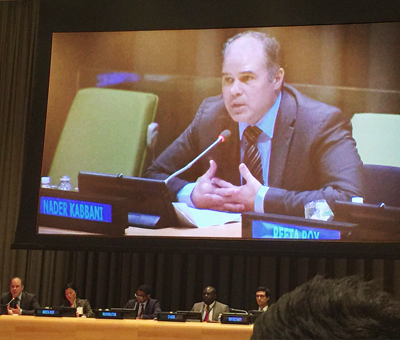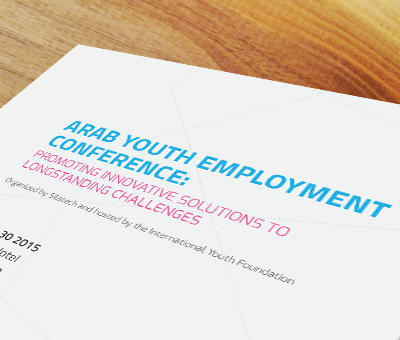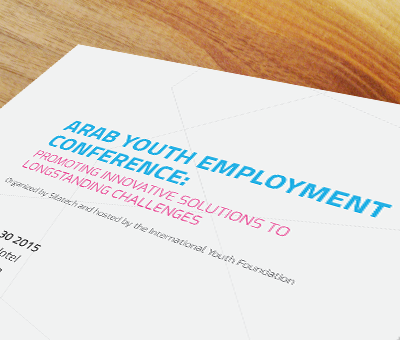The Oman Entrepreneurship Ecosystem Map is designed as a tool for entrepreneurs, support organizations and policymakers involved in Oman’s entrepreneurship ecosystem. It presents the relationship between various organizations and entities involved in finance, education, government, media, the private sector, donor institutions and entrepreneurship support organizations.
The Palestine entrepreneurship ecosystem map is designed as a tool for entrepreneurs, support organizations and policymakers involved in Palestine’s entrepreneurship ecosystem.

An in-depth analysis by Palestine for a New Beginning (PNB) and regional social initiative Silatech has produced an interactive map designed to help enable more effective interaction between entrepreneurs, support organizations and policy makers. Now available at www.palestinemap.info, Silatech web site, and on www.Ta3mal.ps, the ecosystem map presents the relationship between over 100 various entrepreneurship-related organizations and entities involved in finance, education, government, media, the private sector, donor institutions and civil society.
The interactive map provides a short description of each organization and link to its website, as well as information about where each organization operates and, where appropriate, which economic sector(s) it targets.
Palestine suffers from the highest unemployment rate in the Mashreq region, at 23 percent. Palestine’s youth unemployment rate tops 38 percent, higher than the Arab world’s average of 30 percent. The Arab world has the highest youth unemployment of any region in the world.
PNB Chairman Zahi Khouri commented on the need for the ecosystem map, saying “When PNB decided to begin working in entrepreneurship, we discovered a very busy space, yet still very few successes. We decided to work on this map in order for us to better understand the ecosystem, learn and decide where we could play a strong role (as representatives of the private sector and civil society).”
Describing PNB’s role in promoting entrepreneurship in Palestine, Khouri said “We have focused our efforts on showcasing Palestine’s successes through the Celebration of Innovation, and on bringing the different players together through Global Entrepreneurship Week. Members of our board also launched the Ibtikar Fund, which closes a critical funding gap between seed and VC investment. We hope that this map helps organizations developing new support programs understand where gaps remain.”
Rula Shunnar, Silatech Country Representative for Palestine and Jordan, emphasized that “A lack of clear and accurate information often hampers entrepreneurs from getting the support they need; we believe this map will provide a useful tool to help strengthen the entrepreneurship ecosystem, and look forward to working with our partners at PNB to continue supporting the Palestinian people, and especially Palestinian youth, in the future.”
Holding that helping new businesses to start and grow is essential for creating desperately needed jobs, Silatech works with over 100 partners throughout the Arab world to provide entrepreneurship and employment opportunities for young people. Since 2008, Silatech has enabled more than 90,000 youth-run businesses to start and grow, supporting more than 140,000 youth jobs.
In Palestine, Silatech partners with a variety of organizations to support Palestinian youth in areas such as access to microfinance, employability resources and job openings through Ta3mal.ps, career guidance, civic engagement and leadership training.
Palestine for a New Beginning is an alliance of public and private sector institutions and individuals that aims to leverage resources and experience by investing in innovative new projects and building on existing successful initiatives.

On June 1, the United Nations concluded a “High-Level Event on the Demographic Dividend and Youth Employment.” Held at the UN headquarters in New York, the event convened ministers and high-level government officials from over 50 countries involved in addressing the youth employment challenge in their respective countries.
The event was organized by the President of the United Nations General Assembly, the United Nations Population Fund, and the International Labour Organization. Qatar was represented by Ms. Maha Isa Al Rumaihi, Director of the Department of Planning and Quality Assurance at the Ministry of Youth and Sports, Ms. Amal Al Mannai, Executive President of Qatar Foundation for Social Work, as well as members of Qatar’s mission to the UN.
In recognition of its leading role in developing and supporting innovative programming aimed at creating economic opportunities for Arab youth, Silatech was invited by the International Labour Organization to participate in one of two expert panels organized as part of the event. The panel was titled “What Policies and Measures are needed to Create Opportunities for Youth Employment?” Silatech is a regional social initiative that works to create jobs and expand economic opportunities for young Arabs.
Over the past two decades, the Arab region has had the largest proportion of youth in its population of any region in the world. This demographic wave has placed pressure on both the education systems and the labor markets of Arab countries. Indeed, for over 20 years now, the Arab region has had the highest youth unemployment rates in the world by far, reaching close to 30 percent in 2015.
When asked what countries could do to improve the identification and promotion of youth employment solutions that work, Silatech Director of Research and Policy Dr. Nader Kabbani, who participated in the panel on behalf of Silatech, noted that “The youth employment challenge cannot be solved without creating jobs. In most countries, this means supporting the growth of micro- and small enterprises as the main engine of job creation.”
Drawing on Silatech’s experience, Dr. Kabbani identified a number of promising programs and interventions that have been successful in helping young people connect to economic opportunities, including school-based work experience and career guidance, increasing financial inclusion through online crowdfunding solutions, and supporting social entrepreneurship.
Participants in the event noted that successfully addressing the youth employment challenge requires the collaboration of the public sector, private sector, civil society in each country. Only with each sector playing a role and working together can countries help young people reach their full potential.

Policy makers, NGO representatives, and private sector leaders from over 30 countries will gather in Amman from April 28-30 to share solutions and form partnerships to address the challenge of youth unemployment in the Arab world. Organized by regional social initiative Silatech and hosted by the International Youth Foundation (IYF), the “Arab Youth Employment: Promoting Innovative Solutions to Longstanding Challenges” conference will showcase innovative, evidence-based approaches to youth employment that are being implemented by leading youth-serving organizations from throughout the region and the world. The conference is being sponsored by the World Bank and the Americana Group. It is also supported by the Jordan Chamber of Industry.
While youth unemployment is a global challenge, the need for scalable, effective youth employment programs is particularly urgent in the Arab world, as youth unemployment in the Arab countries is the highest of any region in the world, and continues to grow. The jobless rate among Arab youth has increased from 24% in 2009 to 29% in 2014, while entrepreneurship has declined over the same period.
During the three-day conference, participants will share lessons and experiences about a wide variety of topics related to youth employment, including financing for young entrepreneurs, engaging the private sector for youth skills development, the benefits of technology in employment solutions, social enterprises and inclusive business models, and many more. The conference will give special attention to the process of creating successful youth employment policies and initiatives and creating opportunities for practitioners to replicate and grow effective programs throughout the region.
Acting Silatech CEO Mohammed Al Naimi and International Youth Foundation CEO William S. Reese will open the conference with welcoming remarks on Tuesday, April 28. A member of the Silatech Board of Trustees and Executive Committee, Mohammed Al Naimi became Acting CEO of Silatech on April 1 following the recent departure of Dr. Tarik M. Yousef, who served as Silatech CEO from mid-2011 through March 2015.
High profile policy makers slated to address the event will include HE Dr. Nidale Katamine, Minister of Labor (Jordan), HE Eng. Adel Fakeih, Minister of Labor (KSA), and HE Dr. Talal Abu Ghazaleh, Founder and Chair of the Talal Abu Ghazaleh Organization (Jordan). Other policy makers from Egypt, Jordan, Iraq, Palestine, and Saudi Arabia will be participating in the conference as well.
Leading organizations represented at the conference will include the World Bank, the International Labor Organization, Oasis 500 (Jordan), Tamweelcom (Jordan), Mowgli (UK), Save the Children, United Nations Development Programme (UNDP), Beyond Reform and Development (Lebanon), the Abdul Latif Jameel Poverty Action Lab (USA), Ahead of the Curve (Egypt), Tawasul (Oman), Rwaq (KSA), the RAND Corporation (USA), Al Amal Microfinance Bank (Yemen), Ruwwad (Jordan), the Jordan Federation of Tourism Associations, Bayt.com, Injaz Jordan, MicroCred (Tunisia), World Learning, the Egyptian National Competitiveness Council, Silicon Baadia, IHEC Carthage (Tunisia), and GIZ (Germany).
Conference registration is open now. For more information about “Arab Youth Employment: Promoting Innovative Solutions to Longstanding Challenges,” see the conference Website at www.aye2015.org.
This paper updates the earlier literature on youth transitions from school to work in MENA countries in light of new evidence on inequality of opportunity.

Silatech, a regional social initiative, and the International Youth Foundation (IYF), a global youth development organization, are jointly announcing plans to hold a three-day conference designed to develop and implement solutions to the region’s growing youth unemployment crisis. The event, “Arab Youth Employment: Promoting Innovative Solutions to Longstanding Challenges,” is expected to draw over 350 delegates from throughout the Arab world, including representatives from leading NGOs and civil society organizations, policymakers, leaders from the private sector, researchers and the media to share insights and build effective partnerships to support Arab youth employment.
Youth unemployment in the Arab countries is the highest of any region in the world, and is growing. The jobless rate among Arab youth has increased from 24% in 2009 to 29% in 2014, while entrepreneurship has declined over the same period.
Organized by Silatech and hosted by IYF, the conference will be held at the Landmark Amman Hotel in Amman from April 28-30, 2015. This year’s event builds upon the success of the 2013 “Arab Youth & Entrepreneurship” conference in Doha, which brought together delegates from throughout the region to enhance youth entrepreneurship and economic opportunities at the grassroots level.
The conference itself is innovative in its approach, with a crowd-sourced agenda that features 18 sessions that are being organized by over 20 contributing partners – leading youth-serving organizations from across the region and the world. The content will showcase the rich knowledge and innovative approaches that are being developed throughout the region.
The contributing partners organizing sessions at the conference include the World Bank, the International Labor Organization, Oasis 500, Tamweelcom, Mowgli, Save the Children, United Nations Development Programme (UNDP), the Abdul Latif Jameel Poverty Action Lab, Ahead of the Curve, and the RAND Corporation.
Silatech is a regional social initiative that works with partners throughout the Arab world to create jobs and expand economic opportunities for young people. The International Youth Foundation (IYF), founded in 1990, is a global leader in youth development focused on education, employment, and citizenship.
Silatech CEO Dr. Tarik M. Yousef described the purpose of the Arab Youth Employment conference, saying “Over the last decade, many initiatives have been introduced throughout the region to fight unemployment and provide opportunities to our youth. Unfortunately, very few of these have made any noticeable impacts at a national level.”
Describing his hopes for the regional gathering, he added: “It is now urgent for us—and I mean all of us—to learn from each other what types of programs work best, and then partner with others to replicate these programs, scale them up, and achieve substantial impact at the national and regional levels. We are proud to be working with IYF and others to bring together leading minds to innovate and find solutions that work.”
IYF’s CEO Bill Reese reinforced the larger purpose of the conference. “While facing great challenges, today’s Arab youth have the enormous potential to boost economic growth in their communities and across the region. This event brings together the critical players, from every sector, who have the resources and expertise to ensure that potential is realized. IYF looks forward to working with Silatech and many others to ensure millions more Arab youth have the skills and opportunities they need to find success in the workplace, build their own businesses, and contribute positively to society.”
For more information on the “Arab Youth Employment” conference, see www.aye2015.org.
Analyzing the responses of 43 microfinance institutions surveyed in 10 countries across the Arab world, this report provides a description of MFIs’ level and type of provision of youth financial and non-financial services, attitudes toward youth, and assistance required to increase youth outreach.